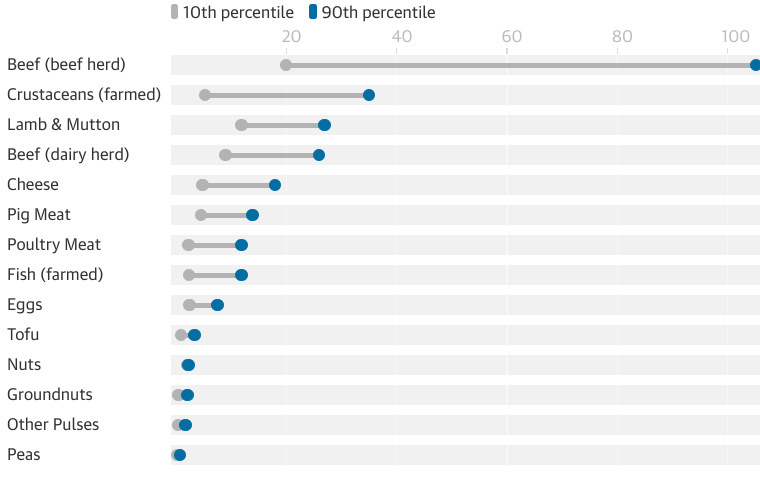https://forum.bikeradar.com/discussion/comment/21055377#Comment_21055377
I think the assertion that transport makes up a negligible amount of the overall carbon footprint is not remotely contentious, and so it stands to reason the places where it is more carbon efficient to farm, for whatever reason, will almost certainly be the most carbon efficient place to buy your meat from.
People love to argue over methodologies, especially when it is a counter-intuitive conclusion, but unless you can come up with a better way of measuring, dismissing it out of hand because it runs counter to your intuition is not likely to be correct.
Things we shouldn't eat (to save the planet)
Comments
-
I'm hoping mushrooms are OK. My top tip is to buy the loose ones if you can when they've started to look slightly shrivelled, as you aren't paying for the water that's now evaporated, and the flavour is still just as good.
0 -
I've certainly found reports to support Rick but I don't understand the methodology enough to comment (and as mentioned above the report is commission by NZ meat producers). I'm really struggling to see how NZ sheep farming differs significantly from that in Wales. As far as I'm aware sheep are left outside in all weathers here and the climate is probably very similar. They may get moved to lower pastures in winter months but the breeding is timed so that lambs are born at a certain time to suit the climate e.g. low lying farms in Monmouthshire will have lambs from January whereas the top of the Beacons it will probbaly be March. They only get taken indoors in extreme snowfall of if the lambs need hand feeding as far as I'm aware. I saw something making reference to NZ farmers planting trees but I'm not sure if that is taken into account in the report, it seems a bit disingenuous to include it (Wales in controversially try to send farmers down that route at the moment). I've also seen a report suggesting the way emissions from livestock is calculated isn't very realistic.
0 -
Sure. Not arguing the 'food miles' point. I'm querying whether there is a national level patterns and differences in the way sheep are farmed between NZ and UK, as opposed to widely varying results across all farms.
If there are national level variations one ought to be able to point to material differences in husbandry. We've established that lambs don't come indoors for winter here or there.
1985 Mercian King of Mercia - work in progress (Hah! Who am I kidding?)
Pinnacle Monzonite
Part of the anti-growth coalition0 -
I mean, I don't think you have, as a 30 second google found lots of advice for rearing lambs indoors, including a British farming forum discussing the pros and cons.
0 -
Some farms rear lambs indoors early in the year because there is a premium on getting lamb into the shops earlier (or that used to be the case anyway, not something i really hear about now i live in the surrey commuter belt). Likewise I guess if you want to get another lambing season later in the year as it starts to get cold again.
0 -
It would be beneficial to eat some meat, like wild venison and rabbit, of which there are too many, but we are prevented from getting into that business by a miriad of laws meant to protect city dwellers from gangsta with hunting rifles.
Other than that, we all know farmed meat is a no go area if you care for the environment. And of course, dairy is just as bad, especially cow dairy.
You can makeca decent enough flat white using barista oat surrogate, which is moderately ultra processed and not terrible, so the need for real milk is somewhat feeble. Eggs instead are difficult to replace, without using ultra processed stuff that will kill you in the long run.
left the forum March 20231 -
Can you accept that farming knowledge is not really one of your strengths? Have you watched Clarkson's farm? A lot of people find it quite informative and you might even enjoy it.
Farmers get so little for one lamb that they need to spend next to nothing on them to make money.
1 -
it’s partly a choice. You don’t have to go the supermarket route. You can spend more, obtain higher welfare or organic status certified and demand top dollar for your meat. You can even sell direct to the consumer or to restaurants. Going the supermarket way is down to the “egg today” mentality and unwillingness to change ways and take risks. It’s lazy and it’s not profitable, I don’t know why they keep doing it to be honest.
left the forum March 20230 -
Because the vast majority of people buy on price? If they all tried the alternatives it would just drive down the prices at that level. There's also a lot of upfront cost to change practices.
0 -
I doubt there is much of a market for even higher priced lamb.
The above may be fact, or fiction, I may be serious, I may be jesting.
I am not sure. You have no chance.Veronese68 wrote:PB is the most sensible person on here.0 -
I'd argue that it is possible to sustain a mixed model (from my French experience), but it needs enough people to be selective about what they buy from which outlet. The UK model generally has lost the direct selling 'vector' (producer markets) as a significant-enough sector to challenge the supermarkets' stranglehold.
0 -
You are wrong, virtually all producers who have gone the small scale, high walfare route and sell to resaurants and direct make profits and don’t look back. The reality is that the days of cheap meat are over, we will all have to buy less of it and pay more for it. Supermarkets pay upfront, so their money is appealing, but ultimately it is not enough… so more and more will either switch or leave… there will be less meat on the market and even supermarkets will have to pay more for it.
My wife buys supa dupa organic chicken occasionally, 18 pounds for a small bird, the same size at the lowest welfare at Tesco is less than 4 quid… guess which farmer turns a profit?
left the forum March 20230 -
In my case, it's less about being selective and more about convenience/accessibility. I am happy to pay a bit extra for quality but if I don't go down the supermarket route then I have to take a half day off work to go to my local butcher, which makes a chicken effectively cost hundreds of pounds!
0 -
As your chicken example shows, the days of cheap meat are not over yet.
If selling direct/small scale etc is such a clear win why aren't more doing it?
- Genesis Croix de Fer
- Dolan Tuono0 -
The chicken market is a massive problem all in itself: from what I read about the ecological disaster in the Wye Valley caused by it, it's an effective monopoly, with the 'farmers' just being treated like cogs in a big integrated/controlled business.
0 -
Anyway this is the eco focused thread. Loads of small scale organic high welfare farms isn't good for the planet, however warm and fuzzy it might make us feel while we swan around the local farm shop.
- Genesis Croix de Fer
- Dolan Tuono0 -
Other views are available.
0 -
Cos they're lazy apparently.
0 -
I would argue organic farming is part of the solution. There is more than just CO2… but even if it just came down to that, organic produces less of it. If the average family ate 1/3 of the meat they do currently, because they have to buy expensive organic, that would be a massive reduction in CO2 emissions. And I don’t buy into the famine argument, when 2/3 of us are obese. We can all eat a lot less meat, one way to force people to do it is to increase welfare and cost, to the benefit of all
left the forum March 20230 -
I think you are confusing lambing sheds, where lambs are born and spend their first few days, and is common to UK and NZ, with being reared indoors.
1985 Mercian King of Mercia - work in progress (Hah! Who am I kidding?)
Pinnacle Monzonite
Part of the anti-growth coalition0 -
Sure, don't disagree with that
- Genesis Croix de Fer
- Dolan Tuono0 -
Not much in there about producing vast amounts of chicken
- Genesis Croix de Fer
- Dolan Tuono0 -
More a comment on the complexity of carbon accounting than whether the animals need to be inside or outside.
Either way I have recollections that some analyses suggest that intensive farming can be more efficient from a CO2 pov...
0 -
...and that ignores the whole ecological and animal welfare aspects. 'Efficiency' can be as dangerous a single-point metric as any other.
0 -
Things we shouldn’t eat (to save the planet) like Ugo said, is pretty straightforward and conclusively proven to be meat and dairy. So, whether your lamb is raised in Wales or NZ, it’s unsurprisingly never going to be a planet saving food source, quite the opposite not just Co2 wise, but land use (endless empty fields of grass).
From The Guardian:
Avoiding meat and dairy is ‘single biggest way’ to reduce your impact on Earth
Biggest analysis to date reveals huge footprint of livestock - it provides just 18% of calories but takes up 83% of farmland.
More than 80% of farmland is used for livestock but it produces just 18% of food calories and 37% of protein
Co2
Sorry Ugo, but organic meat production has been proven to be as damaging to the environment, but I take your point about people eating less as prices rise.
0 -
I’ll ask the founder of my firm who mentioned it to me. He owns a few meat farms on both sides of the world.
0 -
-
You still get less than three figures for a lamb after all that effort. There's no way I'm becoming a sheep farmer.
0 -
Then I'm surprised that you don't understand it a bit more.
0 -












